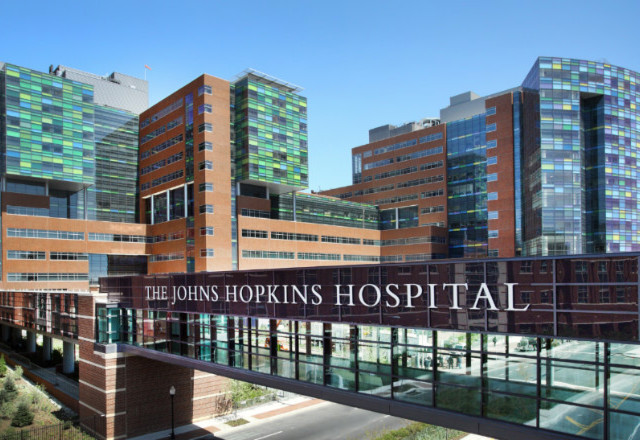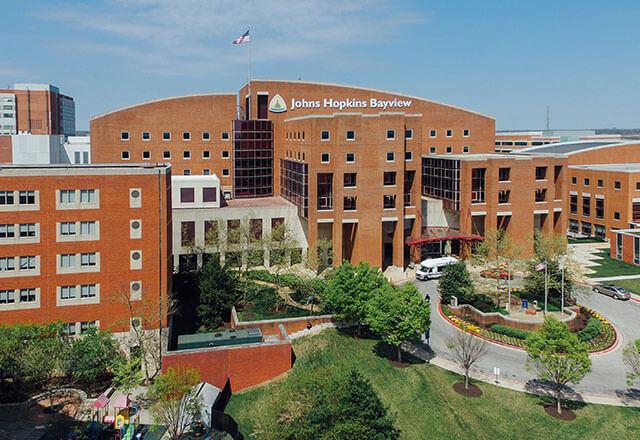Wilmer Residency Training

The Wilmer Ophthalmology Residency Program begins July 1 each year. As one of just five selected residents, you will rotate through eight subspecialties in a personalized training experience.
You will learn under the mentorship of world-renowned faculty members and the assistant chief of service (ACS) - a fellowship-trained faculty member and former Wilmer resident who dedicates one year to teaching residents. During daily morning rounds at 7 a.m., the ACS provides high yield teaching and sees patients with PGY-2 residents and supervises PGY-3 residents in performing trauma surgeries.
Program Training Information
-
Every Thursday morning, you will attend a Grand Rounds conference, in which residents and fellows present the most fascinating cases to be discussed with Wilmer faculty. Afterward, a three-hour formal education session is held that combines lecture, small-group discussion and hands-on learning. In addition, there is a weekly Professor’s Rounds on Wednesday mornings, led by our chair Peter McDonnell, M.D.
Each subspecialty division has a designated division educational champion - a faculty member dedicated to the educational curriculum for their subspecialty. Residents also participate in journal clubs and conferences held by divisions throughout the year. In addition, the program incorporates formal didactics in other important aspects of ophthalmology, including ethics, business of medicine, professionalism, patient safety and quality improvement. Our residents receive world-class training in ocular pathology, as we have an outstanding ocular pathology division headed by Charles Eberhart, M.D, Ph.D.
We have a superb ophthalmology learning resource center, the Friedenwald Library of Ophthalmology, with a full-time librarian.

Evaluation and Tracking of Hours
Evaluations and logging of work hours are performed in a program called New Innovations. Residents receive formal written evaluations midway and at the completion of each rotation. The division education champion for each specialty meets with residents in person twice during the course of the rotation. The program director meets with each resident twice a year to review performance and develop individualized educational plans. The Clinical Competency Committee, composed of several core faculty members, evaluate each residents' progress every 6 months based on the ACGME ophthalmology milestones.
Feedback on the resident's performance is also obtained from peers, patients and staff as required by the ACGME. Residents log their surgical cases through an innovative Epic-based system that is automatically uploaded into the ACGME case logging system that was developed by Wilmer's director of information technology, Dr. Michael Boland. Dr. Boland also developed a system where faculty can launch rubrics to evaluate surgical competency within Epic so residents can review their progress.
-
One of the continued strengths of the training program is a resident continuity clinic, known as PACE (formally the General Eye Service clinic), led by Everardo Hernandez-Quintela.
Residents have their own clinic one day each week, allowing them to follow their own patients for the duration of their residency. In addition to comprehensive ophthalmology, residents get experience with dedicated faculty in subspecialties such as retina, cornea, pediatrics, plastics and glaucoma. All surgical cases generated from this clinic are performed by the resident with a dedicated surgical preceptor. This fosters the development of long-term physician-patient relationships and allows the resident to see how disease and its physical, social and emotional impact evolve over time.

Emergency Department Experience
Wilmer is a designated eye trauma center for the state of Maryland, and the only one in the region. Our surgical volume for trauma is above the 90th percentile for residents in the country, and as a result residents from our program graduate with among the highest number of open globe injury and lid laceration repairs in the country. First year residents take in-house calls in the ED and quickly become facile at managing a variety of ophthalmic emergencies with the help of a second year resident (who is on home call), the ACS, subspecialty fellows and attendings.
Inpatient Consult Service
The inpatient consult service, in which residents admitted patients on other services within The Johns Hopkins Hospital and Bayview Medical Center, and provides frequent interactions with other medical and surgical disciplines. Residents also become skilled in managing burn injuries at Bayview, the region's dedicated burn center.
Emergency Department Call Schedule
First Year (PGY-2): Primary call in the ED of The Johns Hopkins hospital during nights and weekends. Call is approximately one in five days with residents off the day after an overnight call.
Second Year (PGY-3): Back-up call for the PGY-2 resident in the ED of The Johns Hopkins Hospital, and home-call for Johns Hopkins Bayview Medical Center after the first three months of the academic year.
Third Year (PGY-4): Home call for Johns Hopkins Bayview Medical Center for the first 3 months of the academic year.
-
Other strengths of the program include a large volume of patients and ophthalmic surgical cases available to residents, along with dedicated ophthalmology operating rooms and staff. Resident surgical volume generated from PACE gives patient exposure to a diversity of cases, from routine to the most complex.
Residents begin in the operating room as a first year, performing steps of cataract surgery and serving as primary surgeon for oculoplastics and strabismus procedures. Under supervision of the chief, second-year residents perform more open globe repairs than most programs in the country as well as complete cataract and glaucoma surgeries.
Residents perform surgeries at the Bendann Surgical Pavillion on the campus at The Johns Hopkins Hospital, and at Wilmer's surgery location at Green Spring Station Ambulatory Surgery Center.
Microsurgical Training Laboratory (Wet Lab)
A newly renovated, state-of-the-art, microsurgical training laboratory with six stations, an additional instructor station, and video-recording capability provides the opportunity to develop surgical skills on synthetic and animal eyes as well as a computer-based simulator. Each resident works closely with faculty to develop microsurgical skills during their first and second years of residency.
Several additional wet-lab practicums on topics such as minimally invasive glaucoma surgery, small-incision cataract surgery, globe repair, endothelial keratoplasty, and secondary fixation of intraocular lenses occur throughout the year.
-
During the year, residents have the unique opportunity to go to Aravind Eye Hospital for a four-week research elective. This is a special privilege given to few programs in the country and a favorite experience of our residents.

Residents can also choose to arrange other international electives, either surgical or research-based. These electives have been financially supported by grants available through the residency program, the Center for Global Health and the Johns Hopkins Bloomberg School of Public Health.
-
Residents have the opportunity to be recognized for their efforts. The following are the awards given out each year.
- Richard Green Housestaff Teaching Award (awarded by medical students)
- Housestaff Teaching Award (awarded by junior residents)
- Nicholas T. Iliff, M.D. & Sharon A. Kress Excellence in Patient Care Award
- Mitchell Prize for Resident Research
- Frank L. Coulson, Jr. Award for Clinical Excellence
- Pepose-Saltzman Award for a sponsored trip to ARVO
Residents also have the opportunity to recognize faculty during the year with the following awards"
- Resident Advocate Award
- Surgical Educator Teaching Award
- Resident Teaching Award
- Fellow Teaching Award
-
For information regarding salary and benefits, please visit the GME for residents and clinical fellows.
Other benefits that come with residency at Wilmer include:
- Inscribed lenses and loupes
- $1000 educational fund annually
- Food stipend when on call ("Dome" pass)
- Half day given every 6 months for doctor's or dental appointment (wellness day)
- Stipend for international travel for PGY-4's during elective
- A total of four weeks (20 days) vacation each year with flexible scheduling
- Two meeting days allotted each year to attend conferences
- Unlimited meeting days to attend conferences as a presenter
- Stipend for international travel for PGY-4's during elective
Affiliated Institutions

Wilmer at The Johns Hopkins Hospital
Peter McDonnell, M.D., Director, Wilmer Eye Institute
Fasika Woreta, M.D., M.P.H., Residency Program Director
The Wilmer Institute at The Johns Hopkins Hospital is the sponsoring institution of the Wilmer Ophthalmology Residency Program. Most residents' didactic programs (lectures, conferences and wet lab sessions) occur at this location. Wilmer Eye Institute has over 70,000 square feet of patient care space, including a resident continuity clinic and more than 70 exam rooms among the subspecialty divisions.
On certain rotations, residents can join faculty at one of Wilmer's other locations. Most resident surgeries are performed in the Bendann Surgical Pavilion, which consists of seven fully equipped ophthalmic operating rooms, or at the Green Spring Station Ambulatory Surgery Center.

Wilmer at Johns Hopkins Bayview Medical Center
Fernando Arevalo, M.D., Ph.D., Chief of Bayview Medical Center
The Johns Hopkins Bayview Medical Center is affiliated with the Johns Hopkins University and provides ophthalmic care to a large patient population of East Baltimore. First and third year residents rotate at Bayview and see patients in a variety of settings including clinic, emergency department, inpatient wards and burn units under the supervision of faculty. This location is three miles away from Wilmer at The Johns Hopkins Hospital.
